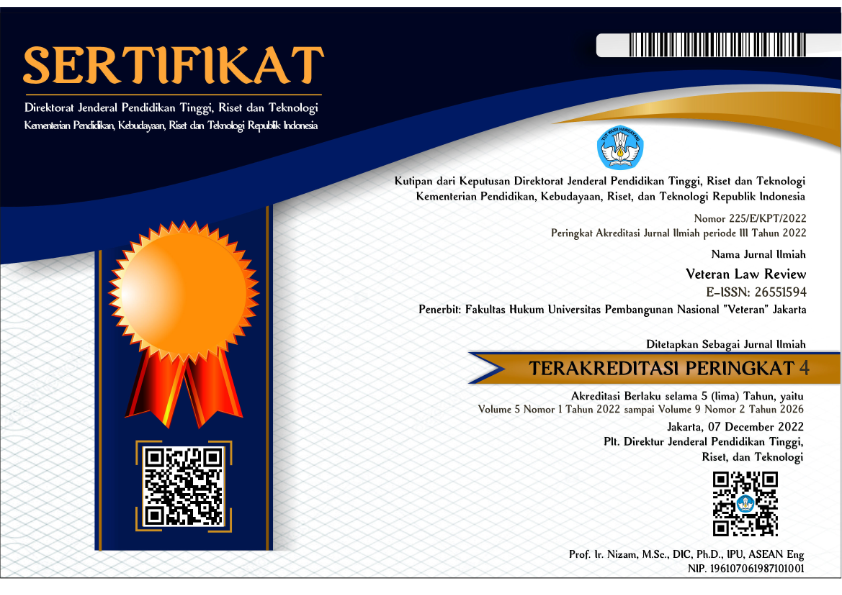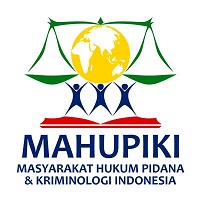Public Participation in the Process of Forming the National Criminal Code to Realize the Welfare State as a Responsive Law
DOI:
https://doi.org/10.35586/velrev.v6i2.6383Keywords:
Society Participation, National Criminal Code, Welfare State, Responsive LawAbstract
The formation of legal products becomes a necessity in responding to the interests of society. The formation of regulations determines whether they are able to distribute comfort and welfare to the community or cause conflict. Get aspirations and agreements from the community is a form of responsive law. The participation of all elements of society is important in the process of producing legal products, especially the National Criminal Code which has been drafted since 1963, but there are still many controversial articles and cause debate in society. This writing uses research methods and data collection techniques in a normative juridical way to find better law and offer solutions to legal problems, by descriptive critical analysis with document study. DPR as the representative of the society has an important role in accommodating and following up on the aspirations of the society. Able to recognize the public's desire to realize the concept of a welfare state and responsive law. Further evaluation needs to be carried out in the legislative process by including the aspirations of the society.
Downloads
References
Journal Articles:
Chandra SY, H. & Irawan, S. P. (2022). Perluasan Makna Partisipasi Masyarakat dalam Pembentukan Undang-Undang Pasca Putusan Mahkamah Konstitusi. Jurnal Konstitusi, 19(4), 766-793.
Djauhari. (2006). Kajian Teori Welfare State Dalam Perspektif Barat dan Islam, Jurnal Hukum, 16(1), 27-38.
Fadli, M. (2018). Pembentukan Undang-Undang yang Mengikuti Perkembangan Masyarakat, Jurnal Legislasi Indonesia, 15(1), 49-58.
Griadhi, N. M.A. Y & Utari, A. A. S. (2008). Partisipasi Masyarakat dalam Pembentukan Peraturan Daerah, Kertha Patrika, 1(1), 1-5.
Sanjaya, R. (2019), Mewujudkan Negara Kesejahteraan yang Ideal Melalui Pembatasan Hukum, 5(1), 1-19.
Books with an author:
Abe, A. (2005). Perencanaan Daerah Partisipatif. Yogyakarta: Pembaruan.
ALjiphart, A. (1984). Democracies: Patterns of Majoritarian and Consensus Government in Twenty-One Countries. New Haven: Yale University Press.
Arinanto, S. Politik Hukum 2. Fakultas Hukum Universitas Indonesia, Edisi Pertama, Jakarta.
Attamimi, A. H. S. (1990). Proses Pembuatan Perundang-Undangan ditinjau dari Aspek Filsafat, Semarang: Materi Kursus Penyegaran Perancangan Perundang-Undangan.
Badan Pembinaan Hukum Nasional Kementerian Hukum dan Hak Asasi Manusia. (2015). Partisipasi Masyarakat Dalam Penentuan Arah Kebijakan Penyusunan Peraturan Perundang-Undangan.
Chandra SY, H. & Irawan, S. P. (2022). Perluasan Makna Partisipasi Masyarakat dalam Pembentukan Undang-Undang Pasca Putusan Mahkamah Konstitusi. Jurnal Konstitusi, 19(4), 766-793.
Dahl, R. A. (2001). Perihal Demokrasi, Menjelajahi Teori dan Praktik dan Demokrasi Secara Singkat.
Direktorat Harmonisasi Peraturan Perundang Undang-Undangan, (2010), Panduan Pengharmonisasian, Pembulatan dan Pemantapan Konsepsi Rancangan Perundang-Undangan. (Jakarta: Kementerian hukum dan HAM, Cappler Project).
Djauhari. (2006). Kajian Teori Welfare State Dalam Perspektif Barat dan Islam, Jurnal Hukum, 16(1), 27-38.
Fadli, M. (2018). Pembentukan Undang-Undang yang Mengikuti Perkembangan Masyarakat, Jurnal Legislasi Indonesia, 15(1), 49-58.
Friedman, L. M. (2009). Sistem Hukum: Perspektif Ilmu Sosial (The Legal System A Social Science Perspective). Bandung: Nusamedia.
Griadhi, N. M.A. Y & Utari, A. A. S. (2008). Partisipasi Masyarakat dalam Pembentukan Peraturan Daerah, Kertha Patrika, 1(1), 1-5.
Halim, H. & Putera, K. R. S., (2009), Cara Praktis Menyusun dan Merancang Peraturan Daerah. Jakarta: Prenada Media Group.
Khalid (2014). Ilmu Perundang-undangan. Medan: CV Manhaji.
Muliana, J. H. R. (2011). Optik Hukum. Jakarta: Prestasi Pustaka Publisher.
Nalle, V. I. W. (2017), Ilmu Perundang-undangan. Yogyakarta: Suluh Media.
Nonet, P., dan Selznick, P. Law and Society in Transition: Toward Responsive Law. New York: Harper & Row, 1978.
Nurbaningsih, E, DKK. (2016). Naskah Akademik Rancangan Undang-Undang Tentang Perubahan Atas Undang-Undang Nomor 12 Tahun 2011 Tentang Pembentukan Peraturan Perundang-Undangan. Badan Pembinaan Hukum Nasional Kementerian Hukum dan Hak Asasi Manusia.
Sanjaya, R. (2019), Mewujudkan Negara Kesejahteraan yang Ideal Melalui Pembatasan Hukum, 5(1), 1-19.
Sunggono, B. (2008). Metode Penelitian Hukum. Jakarta: PT Raja Grafindo Persada.
Website Material:
Aditya, N. R. (2023). Soal KUHP baru Formappi kritik tidak ada partisipasi publik, https://nasional.kompas.com/read/2023/01/06/22401361/soal-kuhp-baru-formappi-kritik-tak-ada-partisipasi-publik, diakses pada 5 juli 2023 pukul 10.45 WIB.
Dewan Perwakilan Rakyat Republik Indonesia, Tentang DPR: Tugas dan Wewenang, https://www.dpr.go.id/tentang/tugas-wewenang, diakses pada 9 Juli 2023 Pukul 10.00 WIB.
Hanifa, L. Anggota Tim Open Parliament Indonesia (Opi), (2021). Partisipasi Publik Dalam Proses Legislasi, https://www.dpr.go.id/doksetjen/dokumen/-Regulasi-dan-Dokumen-Paparan-OPI-Partisipasi-Publik-Dalam-Legislasi-oleh-Hj.-Ledia-Hanifa-S.Si.-M.PSi.T-1622102422.pdf, diakses pada 10 Juli 2023 Pukul 15.00 WIB.
Tim Publikasi Hukum Online, (2022). Partisipasi Publik dalam Pembentukan KUHP Nasional, https://www.hukumonline.com/berita/a/partisipasi-publik-dalam-pembentukan-kuhp-nasional-lt639946fa2918c/?page=all, diakses pada 5 juli 2023 pukul 10.45 WIB.
Peraturan Perundang-Undangan:
Undang-Undang Nomor 13 Tahun 2022 tentang Perubahan Kedua atas Undang-Undang Nomor 12 Tahun 2011 tentang Pembentukan Peraturan Perundang-Undangan (Lembaran Negara Republik Indonesia Tahun 2022 Nomor 143, Tambahan Lembaran Negara Republik Indonesia Nomor 6801).
Peraturan Dewan Perwakilan Rakyat Nomor 1 Tahun 2020 Tentang Tata Tertib (Berita Negara Tahun 2020, Nomor 667).
Downloads
Published
How to Cite
Issue
Section
License
Copyright (c) 2023 Veteran Law Review

This work is licensed under a Creative Commons Attribution-ShareAlike 4.0 International License.
Copyright (c) 2022 Veteran Law Review Journal
Veteran Law Review © 2022 by Faculty of Law Universitas Pembangunan Nasional "Veteran" Jakarta is licensed under Creative Commons Attribution 4.0 International

1. License
The non-commercial use of the article will be governed by the Creative Commons Attribution license as currently displayed on Creative Commons Attribution 4.0 International.
2. Author(s)' Warranties
The author warrants that the article is original, written by the stated author(s), has not been published before, contains no unlawful statements, does not infringe the rights of others, is subject to copyright that is vested exclusively in the author, and free of any third party rights, and that any necessary written permissions to quote from other sources have been obtained by the author(s).
3. User/Public Rights
VELREV's spirit is to disseminate articles published are as free as possible. Under the Creative Commons Attribution-ShareAlike 4.0 International License. VELREV permits users to copy, distribute, display, and perform the work for non-commercial purposes only. Users will also need to attribute authors and VELREV to distributing works in the journal and other media of publications.
4. Rights of Authors
Authors retain all their rights to the published works, such as (but not limited to) the following rights;
- Reproduce the work
- Prepare derivative works based upon the work
- Distribute copies of the work
- Perform the work publicly
- Display the work publicly
- Copyright and other proprietary rights relating to the article, such as patent rights,
- The right to self-archive the article,
- The right to enter into separate, additional contractual arrangements for the non-exclusive distribution of the article's published version (e.g., post it to an institutional repository or publish it in a book), with an acknowledgement of its initial publication in this journal (Veteran Law Review).
5. Co-Authorship
If the article was jointly prepared by more than one author, any author submitting the manuscript warrants that he/she has been authorized by all co-authors to be agreed on this copyright and license notice (agreement) on their behalf, and agrees to inform his/her co-authors of the terms of this policy. VELREV will not be held liable for anything that may arise due to the author's internal dispute. VELREV will only communicate with the corresponding author.
6. Royalties
Being an open accessed journal and disseminating articles for free under the Creative Commons license term mentioned, author(s) are aware that VELREV entitles the author(s) to no royalties or other fees.
7. Miscellaneous
VELREV will publish the article (or have it published) in the journal if the article’s editorial process is successfully completed. JOSI's editors may modify the article to a style of punctuation, spelling, capitalization, referencing, and usage that deems appropriate. The author acknowledges that the article may be published so that it will be publicly accessible and such access will be free of charge for the readers as mentioned in point 3.

















